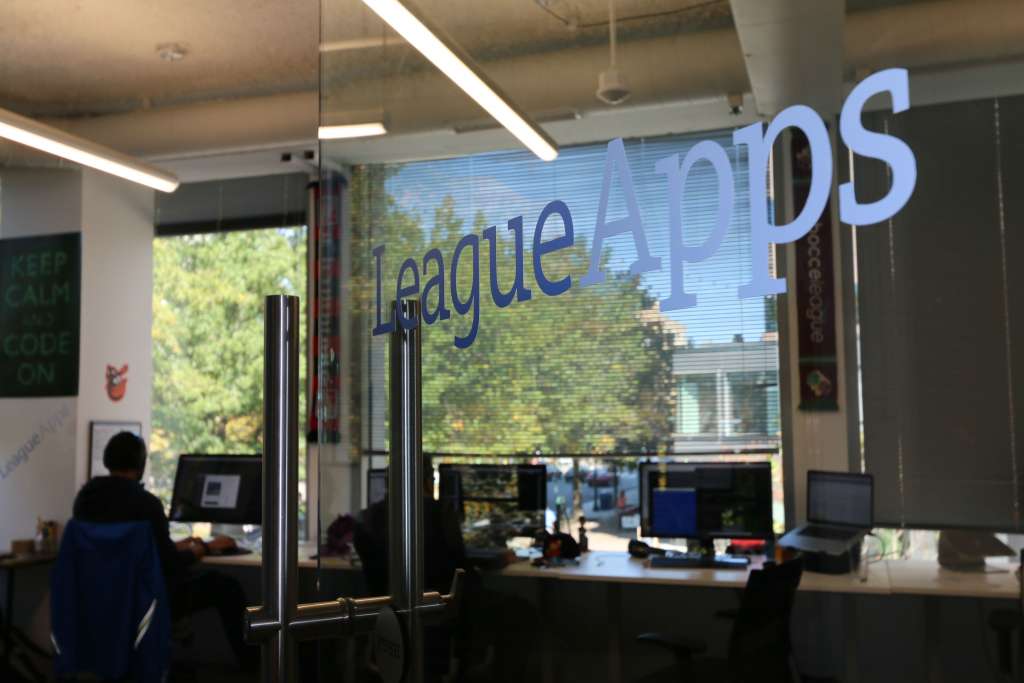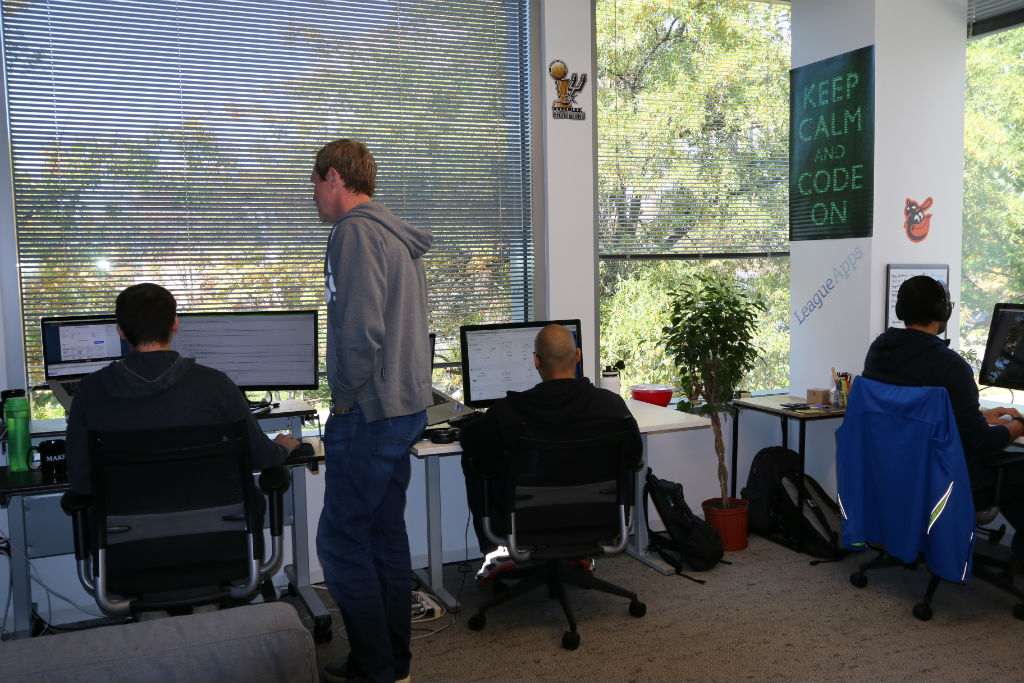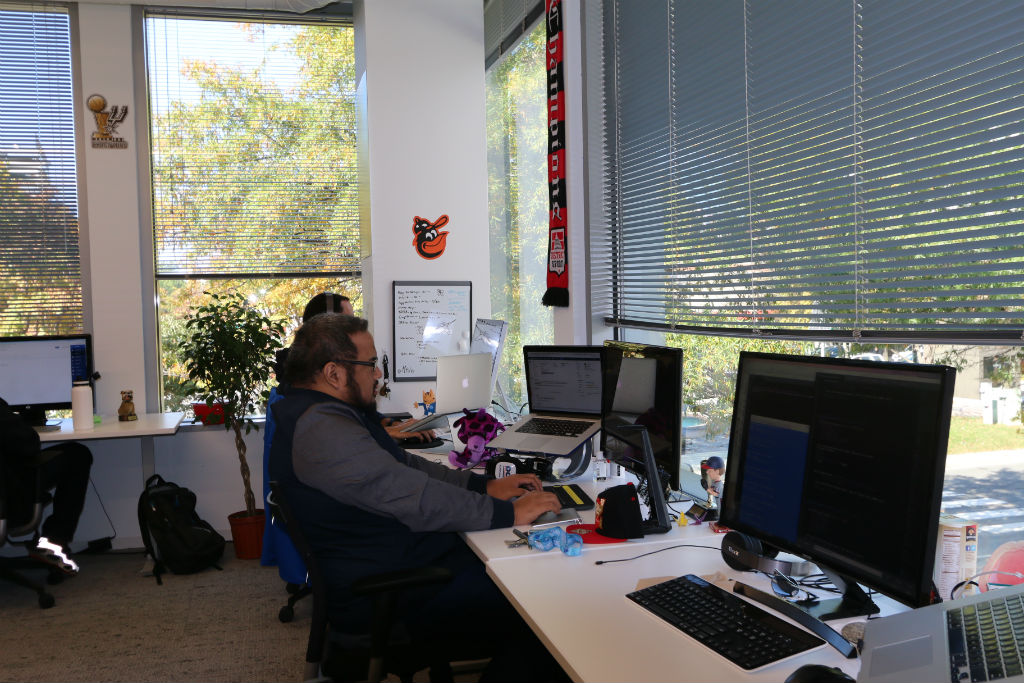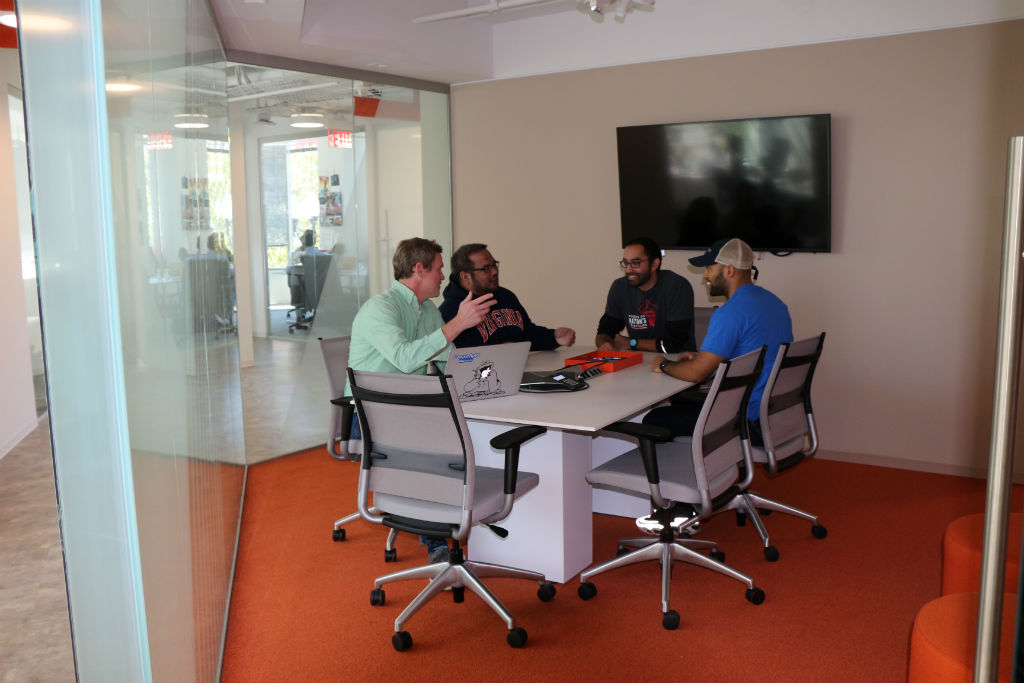The following is the second in a weekly series of articles about a “day in the life” of companies at the MakeOffices coworking space in Clarendon. The mini-series, which will run this fall, is sponsored by MakeOffices.
Just like former Utah Jazz point guard John Stockton made a career of enabling Karl “The Mailman” Malone to score, the workers behind LeagueApps spend every day making assists. They strive to set up every community team that uses their management service with a slam dunk experience.
The app-based service provides a management platform and web presence for youth and recreational sports teams. It organizes tasks such as online registrations, schedules, score databases and payment collection.
“It’s kind of like an all-in-one app for sports organizers to facilitate all the logistics of their registration and what they need to do during the season for communicating with their members,” says Steve Parker, LeagueApps co-founder and chief technology officer.
The service has about 50 employees in two offices: one in Arlington and one in New York. Although the New York contingent works out of a standalone office, Parker says the Arlington employees benefit from being in the MakeOffices Clarendon coworking space.
“One of the things that I like, and I think everyone likes, is being around these other companies. The energy of this place is great,” he says. “As a company, we see the value in having a nice working environment for people. [It’s] an intangible benefit that will pay dividends because they’ll feel more motivated and productive.”
Each day starts with the team having a stand-up meeting to go over what each person is working on, then the team disperses for their tasks. Although a lot of research, planning and strategy occurs in the Arlington office, much of what happens daily at this location is writing and testing code. Some businesses consider that an insular activity that can be performed remotely, but Parker believes staff members benefit from collaborating at the office.
“We can have in-person, live interactions, which are so valuable,” he says. “There’s a lot of questions that come up, issues that we encounter. Being able to talk through things and go to a whiteboard and discuss it live instead of just typing it… is a lot easier and more efficient.”
Having the two offices in different cities also creates a natural separation between the different tasks performed at each. Arlington houses the team behind the software platform and is considered the LeagueApps technology and product hub, whereas the New York office has a greater focus on business aspects such as sales, management, marketing, finance and customer success. “It’s a nice, clean delineation between what we do and they do,” Parker says.
The environment doesn’t just have a positive effect on employees. The conference rooms come in handy on the days when employees bring in clients for meetings. “The conference rooms and breakout rooms are key. We use those all the time,” says Parker, noting that clients are impressed when they visit the space.
So far, the business model appears to work. Parker says LeagueApps has nearly doubled in growth each year since its launch in 2011. “Just like any startup we’ve worked out a lot of kinks and have gotten to a point where we have a good model and we have a strong product-market fit. We’re continuing to refine that,” he says.
On occasion, the refining happens while interacting with employees at the other businesses in the coworking space. “Sometimes there’s technologies that we’re using that we can have conversations about and gain some quick insights,” says Parker.
One business improvement that has helped LeagueApps is choosing a handful of sports to focus on — such as lacrosse, soccer and baseball — and catering the platform to each, rather than having one generic platform that could be used for all sports. Customers get more value with the sport-specific focus because “different sports have slightly different ways of doing things,” Parker explains. “So we’ve built our platform to be customizable to all the different things that sport organizers do… our account executives and our support services are all tailored by sport.”
Although the team buckles down and works hard at the office, there’s plenty of room for being social. Such as when amidst the quiet typing and clicking, one employee nonchalantly teases another and everyone laughs. That spirit spills over from the work day into evening happy hours, sometimes on-site (MakeOffices provides a selection of locally-brewed beers on tap from four kegerators in the kitchen) and sometimes at nearby Clarendon watering holes.
“The space and location are good for team building activities,” Parker said.
One of those activities happened last week when LeagueApps team members had a unique gathering after work in one of the MakeOffices common areas. They all invited loved ones to “family night,” which involved thanking families for all their support. Hungry, another startup in the coworking space, catered the event.
“It was a way to have a team building, cultural activity as a way to say thanks,” while at the same time supporting a fellow startup, Parker says. “We’re interested in these startups because we’re a startup.”
The immediate future involves LeagueApps expanding into an area Parker in particular can appreciate because he coaches youth soccer and flag football. “We’ve focused to date more on tools for the sports organizers, but we’re also starting to focus on tools for the participants, meaning the coaches, the parents and the players,” he says. For example, one feature in the works is to incorporate into the platform a way for team sports participants to easily message and reply to each other via various communication modes.
“I love the thrill of building something, of having a lot of things going on and staying on top of those things, staying really busy,” Parker says. He and the other LeagueApps employees do indeed stay busy as they work to make the service’s platform better by adding features and improving quality.
“Our goal is to continue on this path to be the best platform for youth sports,” Parker said.






